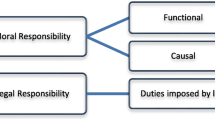Abstract.
Although the courts have ruled that companies are legal persons, they have not yet made clear the extent to which political free speech for corporations is limited by the strictures legitimately placed upon corporate commercial speech. I explore the question of whether or not companies can properly be said to have the right to civil free speech or whether corporate speech is always de facto commercial speech not subject to the same sorts of legal protections as is the right to civil free speech. In the absence of clearly defined legal precedent, I emphasize moral reasons for determining the appropriate limits of corporate civil free speech. Appealing to arguments typically used to justify individual rights to civil free speech, I examine the extent to which this sort of justification may or may not be legitimately extended to corporations. I conclude that corporate rights to civil free speech must be restricted because granting rights of free speech to institutions may, in practice, undermine the moral rationale and practical feasibility of guaranteeing rights of civil free speech to individuals. Furthermore, I argue that granting corporations full rights to civil free speech will undercut attempts to develop good moral character in corporate institutions by undermining the efforts of watchdog organizations.
Similar content being viewed by others
References
A. Bernstein (2003) ArticleTitleSweatshops: Finally Airing the Dirty Linen Business Week 3838 100
Habermas, J. (1975). The Legitimation Crisis of Late Capitalism, T. McCarthy (tr.) (Beacon Press, Boston, MA)
Habermas, J. (1989). The Structural Transformation of the Public Sphere: An Inquiry into a Category of Bourgeois Society, T. Burger (tr.), (MIT Press, Cambridge, MA.
A. Haworth (1998) Free Speech Routledge New York, NY
S. Holmes (2003) ArticleTitleFree Speech or False Advertising Business Week 3830 69
A.M. Kanzer C. Williams (2003) ArticleTitleSocial Reporting Remains at Risk Business Ethics 17 1–3
McCall, W. (2003). Nike Settles Commercial Free Speech Case’, AP line
McCloskey, H. J. (1980). Liberty of Expression: Its Grounds and Limits (I)’ in F. Berger (ed.). Freedom of Expression Wadsworth, Belmont CA.
McHugh, D: 2004). Companies Say Ethics Needed, Not Rules’, AP line
Mill, J. S.: 1859). On Liberty, E. Rapaport (ed.), (Hackett Publishing Co., Indianapolis, IN)
T. Nace (2003) Gangs of America: The Rise of Corporate Power and the Disabling of Democracy Berrett-Koehler Publishers Inc San Francisco. CA
K.C. O’Rourke (2001) John Stuart Mill and Freedom of Expression The Genesis of a Theory Routledge New York, NY
J. Rawls (1971) A Theory of Justice The Belknap Press of Harvard University Cambridge, MA
L. Soley (2002) Censorship Inc The Corporate Threat to Free Speech in the United States. Monthly Review Press New York, NY
Author information
Authors and Affiliations
Corresponding author
Rights and permissions
About this article
Cite this article
Stoll, M.L. Corporate Rights to Free Speech?. J Bus Ethics 58, 261–269 (2005). https://doi.org/10.1007/s10551-005-1420-9
Issue Date:
DOI: https://doi.org/10.1007/s10551-005-1420-9




